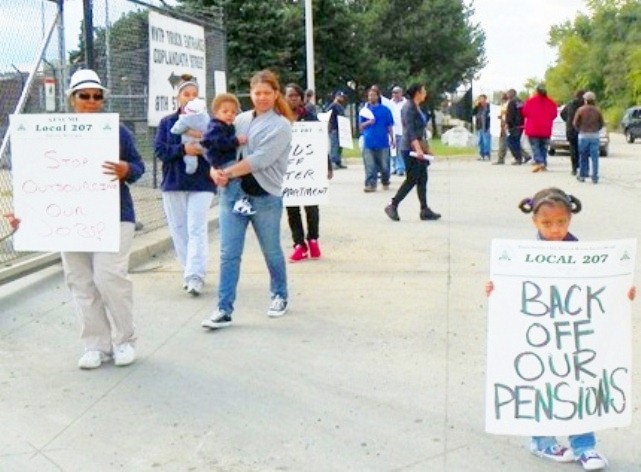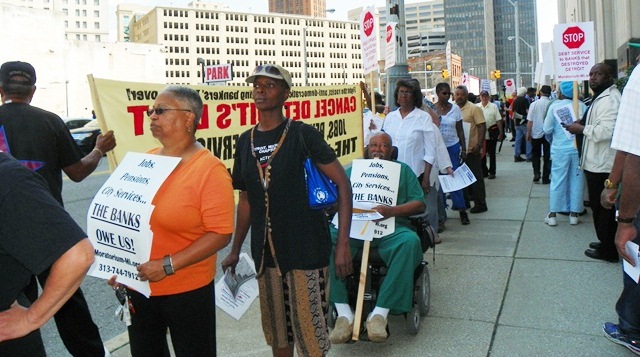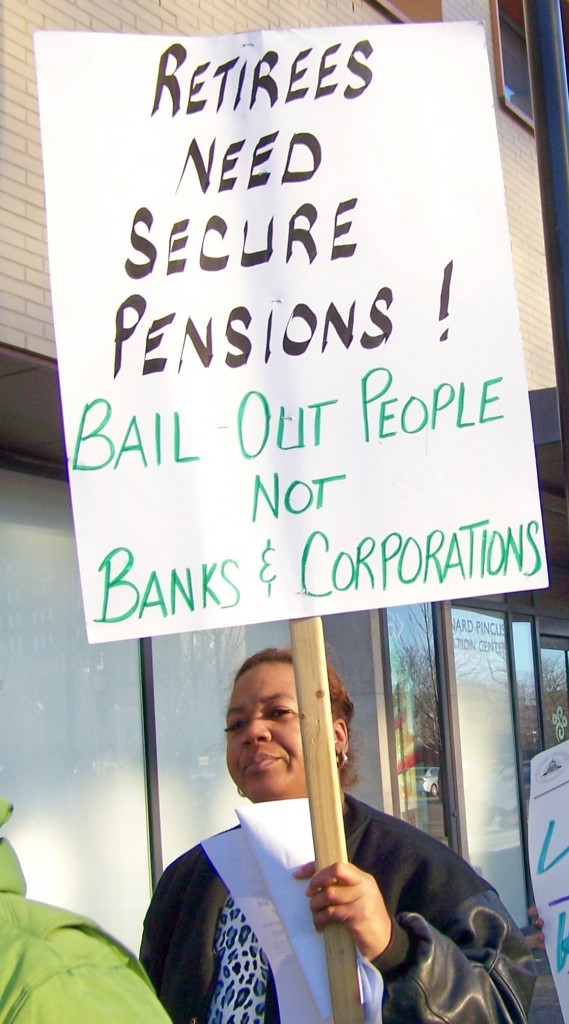
Detroit city workers on strike at the Wastewater Treatment Plant Sept. 30, 2012: BACK OFF OUR PENSIONS!
Commentary by John Riehl, Chairman of the Board of Trustees of the Detroit General Retirement System
September 28, 2013
It is far easier to be a Monday morning quarterback than to play the game Sunday night.
The current review of more than a quarter of a century of how the General Retirement System handled excess earnings has presented some assumptions that belie the intentions of the system’s board at that time.
The mandate of the GRS Board of Trustees is to best serve the interests of its union and nonunion members and beneficiaries. The benefits authorized by the board must be consistent with the approved benefit provisions adopted by the City of Detroit and various unions. The board does not negotiate benefits or have the authority to grant benefits not authorized by the plan.
In the 1980s, when GRS investments earned returns significantly higher than the assumed rate of return, the board, as the pension plan administrator, disbursed the approved benefit — the 13th check, which was discontinued in 2011 — to the retirees. Those earnings were generated, in part, by assets they contributed to the plan while they were employed.
These additional returns also were credited to the employees’ annuity accounts, encouraging more contributions. Millions more were credited to the City of Detroit to reduce its future contributions.
A retiree excess-earning reserve fund was established to set aside monies for the specific purpose of funding a 13th check in years that might not be so profitable.
From 1985 to 2006, 54% of the excess-earnings funds distributed went to the employees, 31.9% went to the City of Detroit and 14% went to the retirees, including interest and the excess-earning reserve fund.

Lehman Bros. collapse due to predatory, fraudulent mortgage lending triggered global economic meltdown. Ernst & Young did Lehman Bros. books, is now advising City of Detroit.
Some say that if the board had invested those excess earnings funds over the 23-year period, the pension fund would be in better shape today. Given the numerous factors that influence fund performance over such a long period, it’s impossible to predict whether that’s true.
One thing is certain, the world changed with the global financial crisis of 2008. The GRS, and all public and private pension systems, would be in a much stronger position today had it not occurred.
Another factor is a shrinking work force. In 1985, the GRS represented 11,679 retirees and 13,385 active City of Detroit employees. Today, the GRS represents 11,730 retirees, and 5,525 active employees, not including Police and Fire Retirement System beneficiaries. That’s significantly fewer employees paying into the fund than years past — and it’s made an impact.
Meanwhile, struggling retirees put money back into the local economy, employees were able to save more for their future, and the city had fewer contribution obligations to pay to the fund.
We are presently funded at 77%. Comparatively, the Wayne County and State of Michigan pension systems are funded at 46% and 65.5%, respectively.
The current GRS Board has made decisions that have resulted in a top quartile performance for the last several years. We are well-managed, transparent, accountable and fiscally responsible. Today, the challenges before us are different than any we have experienced, but we are well-equipped and ready to meet them.
(VOD editor: Story on recent bankruptcy hearings which focused largely on pension issues, featuring Gov. Rick Snyder, EM Kevyn Orr, and others will be up shortly.)







